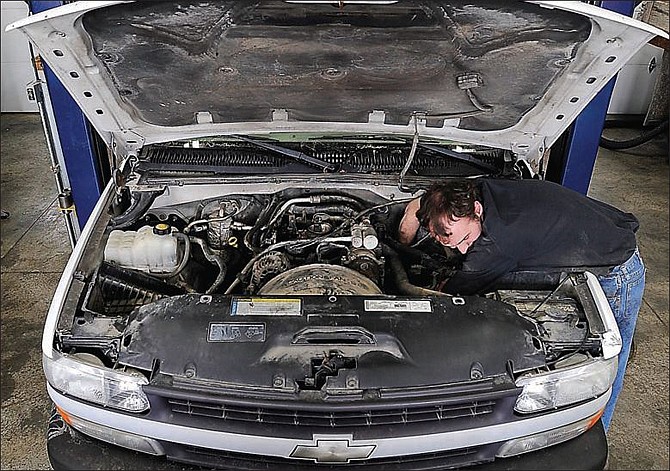We change our clocks and clean our homes in anticipation of spring, but the change of seasons also signals it's time for a checkup for our car.
Like with our own health, a preventative approach to car maintenance can ward off some major problems down the road.
Regular oil changes, keeping your tires inflated and replacing windshield wiper blades are routine types of ongoing maintenance, but offer safety benefits, maximize our car's performance and can also add up to significant cost savings.
According to an article on Modern Tire Dealer's website, "performing simple and inexpensive maintenance can save as much as $1,200 per year in gas costs."
That amount is based on the formula of driving 15,000 miles, averaging 20 miles per gallon and using 750 gallons of gas. At $4 per gallon, the yearly cost for gas at would be $3,000.
A properly tuned car improves mileage by an average of 4 percent, and keeping tires inflated to the recommended air pressure settings can improve mileage up to 3.3 percent or $99 per year. Replacing dirty or clogged air filters improves mileage up to 10 percent or $300 per year, and using the vehicle manufacturer-recommended grade of motor oil improves mileage by 1 to 2 percent or $60 a year.
Most auto manufacturers recommend using synthetic oil, and Tyler Woods with Dennis Oil Company, a Springfield, Mo., based supplier of lubricants, urges consumers to follow those guidelines.
"If GM suggests you use a full synthetic oil, I would do so because an engineer builds those motors and knows what will get the best performance as well as avoid other problems down the road," said Woods, who works at the Jefferson City distributorship.
While a synthetic oil change can cost more than double that of a conventional one, you can go much longer before requiring the next service. The standard rule has always been to change the oil every three months or 3,000 miles, but with synthetic oil some cars can go 10,000, 15,000 and up to 20,000 miles in between oil changes.
Woods advises consumers to use a full synthetic or a conventional rather than a semi synthetic or blend, which he describes as a lesser oil quality. "We, as a company, never push a customer to use a more expensive oil, we let the them make the ultimate decision," said Joshua Lehmen owner of On-Site Oil Change in Jefferson City.
Lehman carries DOC oils and all of them are American Petroleum Institute, API, certified.
"Sometimes, when the manufacturer recommends the use of synthetic oil, customers choose to go with a standard grade or high mileage oil.
"The only real difference is there are more additives to help condition and lubricate the internal engine," he said.
Lehmen also uses a higher quality oil filter, too. It's not just oil that needs to be considered, but the type of filter matters, too.
"In the 10 years I've been in business, I always buy filters made in the U.S., rather than those in China," said Lehmen.
In addition to regular oil changes, it's important to check the vehicle's ride control system once a year and to replace worn shocks and struts at 50,000 miles. Worn shocks and struts can make the tires wear more rapidly and the front brakes also have to work harder.
"Too many people just start their car, drive off and figure that means their car's running properly, but that's definitely not the case," said Phil Lepage, manager of Jim Lewis Tire & Wheel on Missouri Boulevard.
He recommends following the manufacturer-recommended maintenance in order to take care of your car during its lifespan.
"It's important to make sure you have the proper plugs and change the air filter, but for better fuel economy and operation of your car, you need to do more extended type of services, such as cleaning your fuel induction system," he said.
Over time, he said, fuel residues and other deposits build up that can reduce engine performance and cause driveability problems, so this service should be done every year or every 30,000 miles. Jim Lewis Tire and Wheel offers a BG Complete Induction System Clean-up Service, which removes these deposits from EGR ports, the Fuel Induction System, Air Intake System and Combustion Chambers. This service costs $139 and usually takes an hour to perform.
Check the filter, too, if your car has one. Some auto manufacturers put the fuel filter right into the fuel pump. For those that do have one, after five years or so their car can accumulate a lot of dirt in the gas tank and if that makes it into the engine it can do a lot of damage. When the filter is clogged, the proper amount of fuel can't get through and the car can struggle when you accelerate.
Whether it's more involved maintenance or relative inexpensive, keeping your car serviced can make a big difference in its performance, and spending money now will pay off by possibly avoiding a much more expensive problem from arising in the future.

